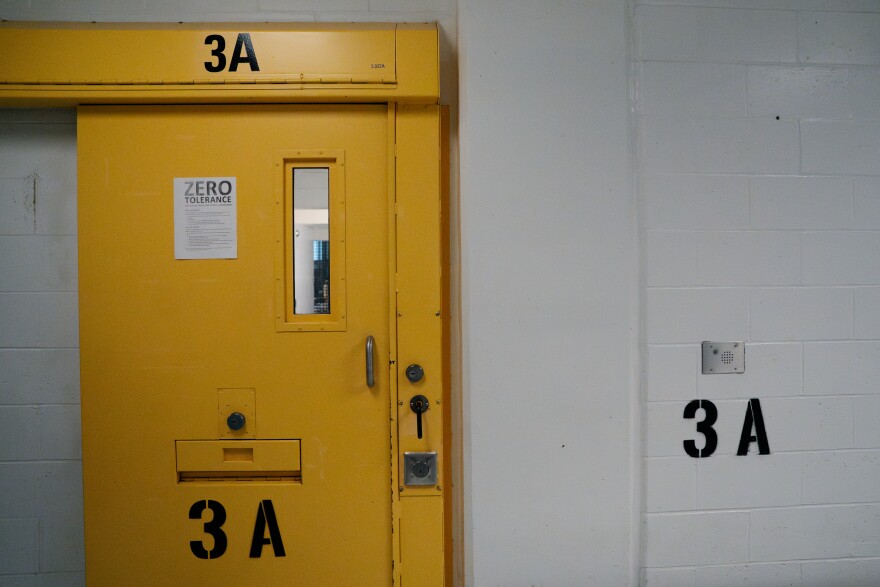St. Louis’ Division of Corrections has a new commissioner whose priorities include updating the facility’s use-of-force policy and increasing public transparency at the St. Louis City Justice Center.
Nate Hayward began in the position on Sept. 16 and has 32 years of experience working in corrections in St. Louis County. A New Jersey native, he previously served as deputy director of security at St. Louis County Justice Services, overseeing the facility’s daily operations, including the health and safety of roughly 1,200 people detained there.
The city jail on South Tucker Boulevard in downtown St. Louis has been riddled with internal problems and controversy for years, but the new commissioner says that after helping to reduce use of force by guards at the county jail, he plans to do the same in the city.
At least 20 people have died while in custody of the city jail since 2020. A funeral for the most recent, Samuel Hayes Jr., was held last month. Hayes died after he was placed in a restraint chair inside the jail, following an altercation with another detainee.
The city jail has experienced high turnover in its leadership over the last year — former warden Jennifer Clemons-Abdullah spent a rocky three years at the helm and was fired late last year; Deputy Commissioner Tammy Ross was appointed to lead temporarily before Doug Burris became interim commissioner in January. Ross was temporarily appointed again after Burris’ short-term contract ended last month.
Hayward sat down with STLPR reporter Lacretia Wimbley and shared plans to hold an open-door policy for community activists and families of detainees.

This interview has been edited for conciseness and clarity.
Lacretia Wimbley: You’ve been in corrections for more than 32 years — you’ve served as a correctional officer and worked your way up to overseeing daily operations at the St. Louis County Justice Center.
It’s no secret that there have been longstanding problems at the city jail, so why did you accept this position?
Nate Hayward: I believe I can help the city jail become successful. The last three years, when I became deputy director at the county, we had issues also, and I fixed that. So I'm looking forward to trying to help the city jail with my leadership team. I believe we can do it.
Wimbley: What were some of those issues?
Hayward: Our use of force was pretty high. Once I took over, the use of force went down completely. That was (a) credit to our leadership team.
Wimbley: When you say use of force, you mean COs (correctional officers) against detainees?
Hayward: Yes, instead of just going right in and just pepper spraying, we try to communicate first and talk them down before you automatically pull your pepper spray out.
Wimbley: You’re familiar with your predecessor, Doug Burris, since you two worked together at the county jail. One of his priorities was hiring more staff.
Can hiring more staff improve things?
Hayward: Yes, it helps out a great deal, because you'll have more officers in areas making sure that we’re conducting tours on a regular basis and making sure that they’re on time.

Wimbley: What will you do differently here to make a positive impact?
Hayward: Our new training coordinator, right now, he's working on our use of force policy. We’re starting with that first, and then we’re gonna move on to other policies. When you have an open door with the outside, I believe you kind of get rid of all the rumors, and you let people see what's going on, and they understand, making sure you're doing the right thing.
Wimbley: What did that look like out in the county?
Hayward: I met with a lot of the reverend activists in St. Louis County. They call and ask, can they meet with me, and I’ll meet with them, and they’ll come up to my office, and we’ll discuss different issues that they heard about. I'll show them on the video what happened, and they understand. So they'll go back out to the community and let the people outside know that everything was done correctly.
Wimbley: Burris mentioned that there's still some conflicting culture within the city jail among staff and COs. He mentioned that some understand the importance of productive relationships with detainees, and others are old school, preferring outdated punishment methods.
How do you shift the culture within the jail for the better when it's been that way for so long?
Hayward: I think just training and also meeting with everyone and letting them know the direction that you're going. I want to hear what they want to talk about. You know, get some feedback, and we're going to move forward, and hopefully we could change the culture in here.
Wimbley: Since a significant number of pre-trial detainees have been dying in custody, family and friends of loved ones inside the facility are angry and frustrated, and some don't believe anything will change.
What would you say to them?
Hayward: First, my condolences to the families. The way we’re going to be doing things with the training, I’m praying that we can change the culture and also just outside family members, if they would like to see what we’re doing (they can) communicate with me — I'm open to talk with them and let them know that we are going to make this place better.
Wimbley: Is there anything else that you would like to add that you think people should know about your personal philosophies?
Hayward: I'm a family man. I have five grandchildren. Every chance I get, I spend with them. I love what I do, and I have a passion for it. I brought so many different devices to St. Louis County, from going to visit jails in Florida, South Carolina, Arizona, Texas, and I'm looking to continue to do that, to bring some great ideas here at St. Louis City.







